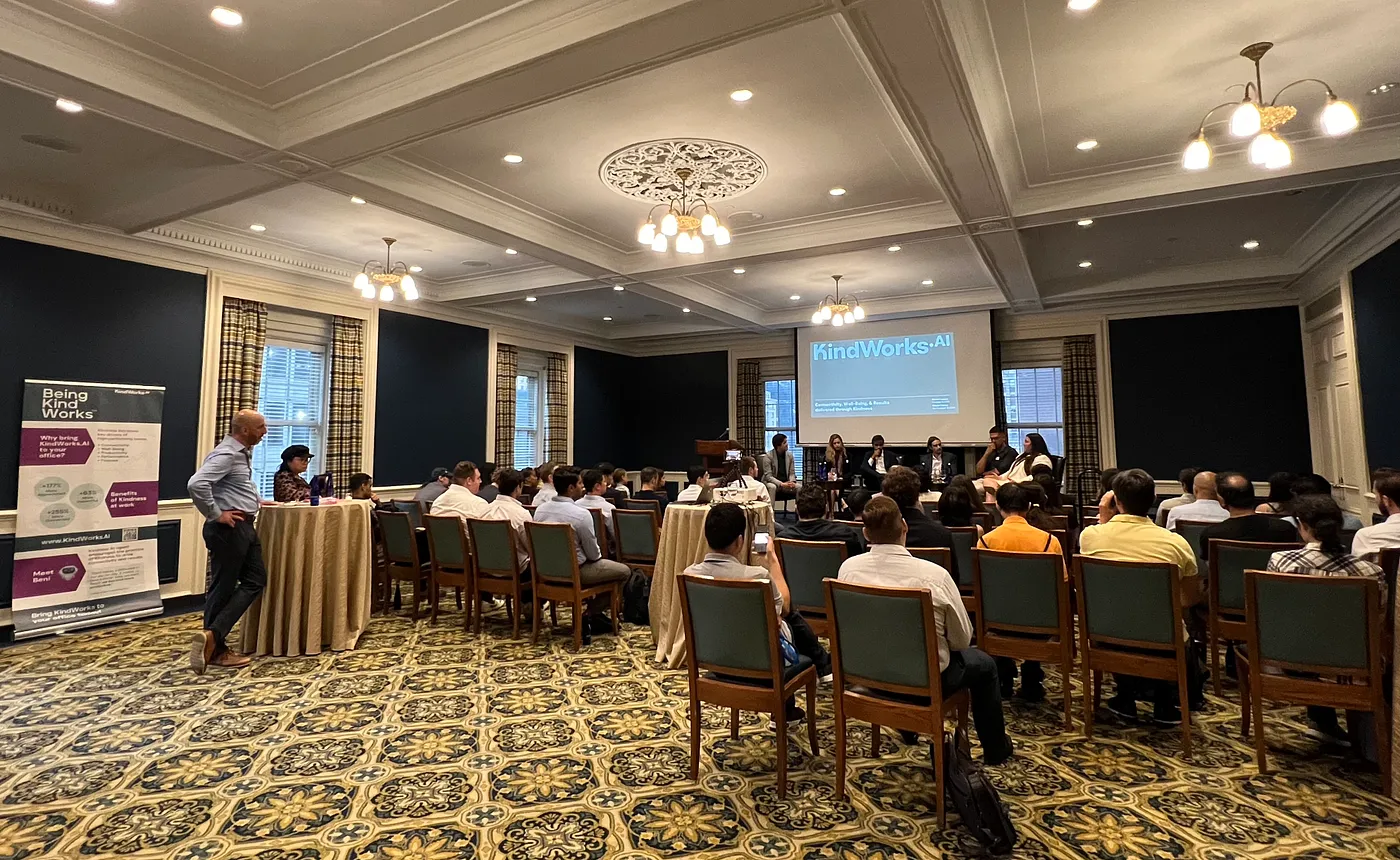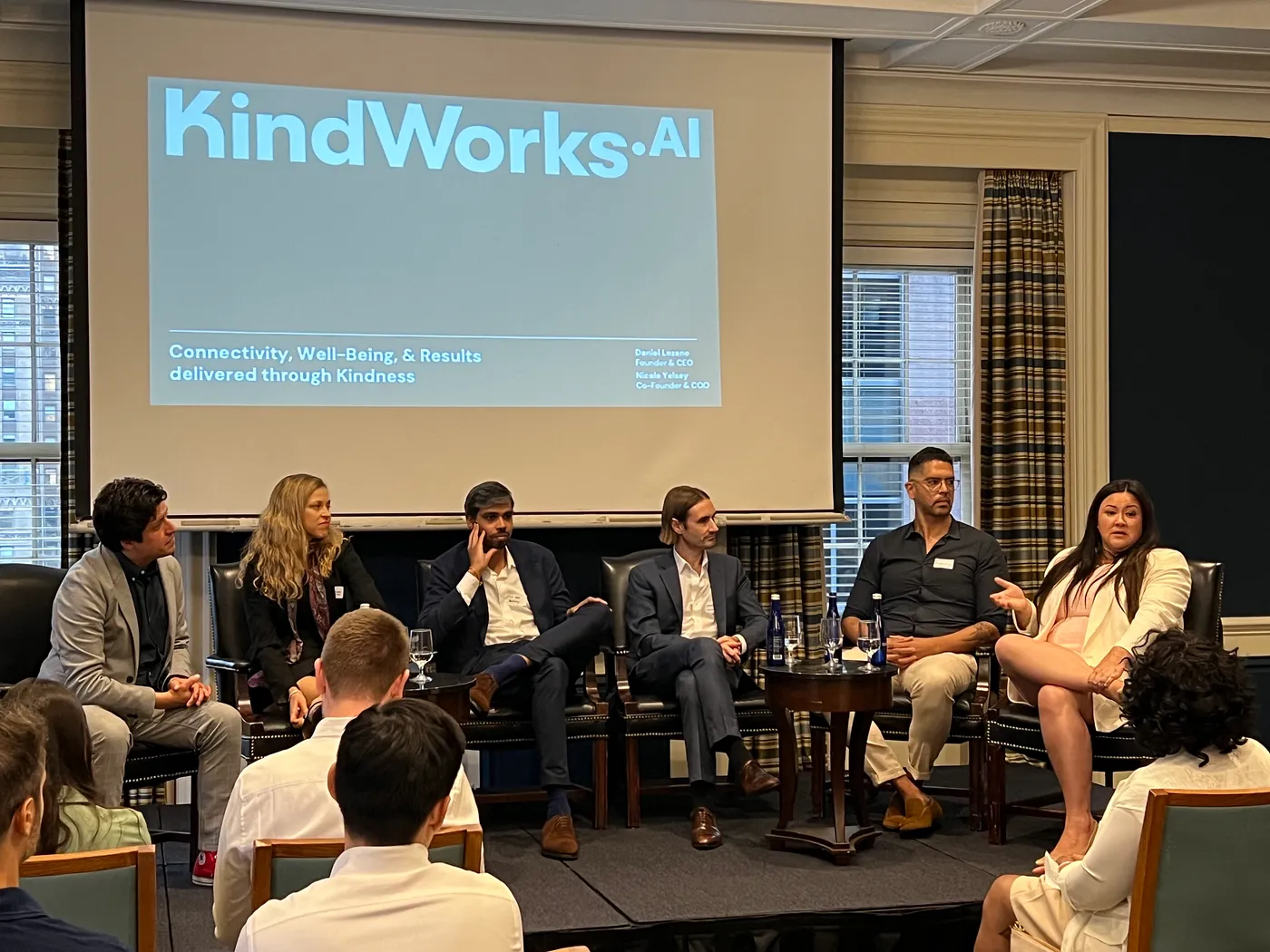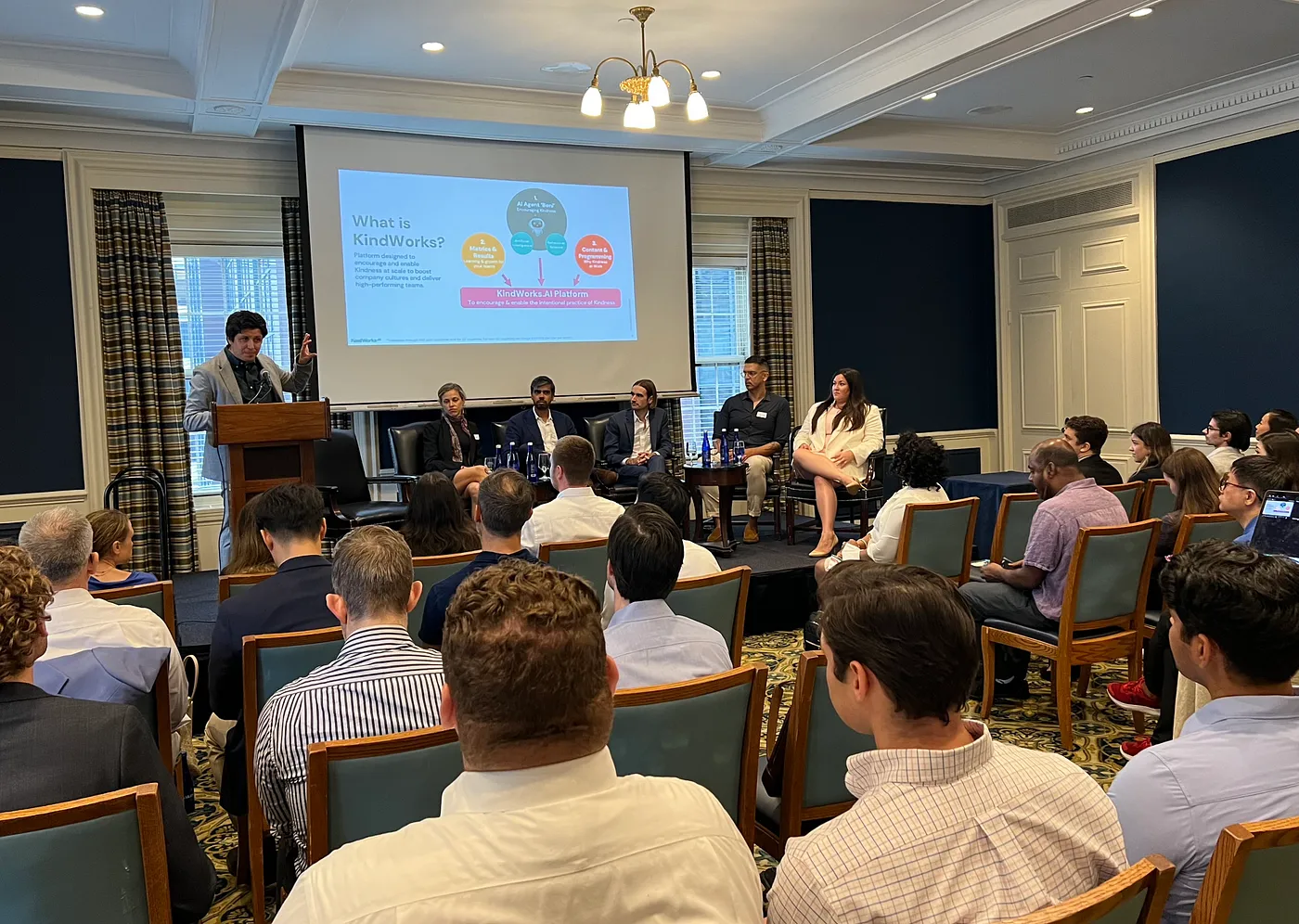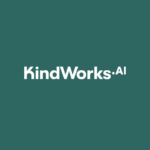Reflecting on Building a Brighter Future of Work, NYC.

Nearing the end of my summer internship as Marketing Intern at KindWorks.AI, I virtually participated in a discussion hosted in New York as part of our ‘Building a Brighter Future of Work’ series. The event brought together leaders from various industries including Florencia Ardissone of JP Morgan Chase, Harry Lewis of Apex by Mariposa Group, Kelly Ong of KIND Snacks, Samuel Bordenave of SWTCH, and Tejas Shah of McKinsey & Company. Our esteemed panelists sought to explore not just what it means to build a brighter future of work but, beyond that, a brighter future of life. I hope some of the insights this discussion inspired are valuable to you and your business.
The Meaning of Work
An important insight I garnered from the discussion was that the immediate impact of our work is no longer self-evident, and thus, company culture is becoming ever-more important.
It occurred to me that in the digital ecosystem, as we become hyper-specialized, and further removed from the end-product, we lose sight of the original meaning of work — creating great products and services that serve society. Consider a blacksmith in the 18th century, he knew what he was creating, and he could feel how his products were changing his customers’ lives. Now contrast this with a project manager working in his apartment behind a digital screen, and his whole work-life is just a blizzard of procedures, institutions, and acronyms. It’s not that this person is not contributing concretely, but the meaning of his work is not self-evident. Nor is he being recognized for his contributions or being presented opportunities outside of his narrow scope. No wonder we are searching for impact and feeling disengaged!
Besides acknowledging my privilege, I feel it is important to keep perspective: work should ultimately be about contributing to the parts of the system that I am best positioned to support. How can I use my skills to lift others up, enable access to opportunities, help key production processes to run more smoothly, or expand access to basic goods and services? Furthermore, how can I enable others to do the same? How can I support my colleagues and remind them of the good and important work they are doing? How can we all feel like we are, and actually make a scalable impact? These are questions I will continue to explore.
“We need to think about our role in the broader society…A brighter future at work is also a brighter future at home.” Florencia stated, “A brighter future everywhere is us being a more engaged society. The reality is in order for us to keep ourselves relevant- we need to upskill ourselves. We need to learn how to upskill ourselves in mass– and support people who are not educated, nor equipped to think about what upskilling means…how do we get companies to enable populations to sustain their paychecks and live their lives, be proactive, and have everyone feel like they are excited about what they are doing?”

Authenticity and Diversity
Another major point of insight from the event was the concept of creating space for authenticity in an increasingly diverse workplace. The panelists emphasized the value in connecting with each team member and understanding what drives them to work each day. Instead of boxing someone into a specific role, perhaps a leader should allow individuals to grow and explore related skills, e.g. encouraging engineers to explore UI/UX design if they so desire.
As Harry elaborated, we should allow the space for authenticity and creativity within the constraints of what is accepted in a group. Tejas reflected on how he tailored his style as a leader according to what he perceived were the different values and goals of his team. As Florencia put it, you should be transparent about, “what you bring to the table, what you think you bring, and what everybody else is bringing, and then celebrate those successes jointly. By doing that, you are creating that sense of unity that is helping you to drive further impact.”
Additionally, openly reflecting on what’s working well and what isn’t is crucial. Transparency without fear, or allowing individuals at all levels to share feedback both up the ladder and down without anxiety about job security or a missed promotion cycle is vital. Samuel talked about how in hyper-growth environments, there is also this urgency to get things out as fast as possible, but it is important to have a look-back and feel proud. On the flip side, the rapid pace of growth can push aside the important but difficult question, (on both a business and personal level) ‘do we actually want to grow in this direction?’
Work-Life Balance
Work-life balance is the perennial question that is at the forefront of all our minds. How do we juggle the myriad responsibilities and commitments we have in the various realms of our lives, while allowing time to relax, but simultaneously pushing ourselves to grow?
One possible answer: People need to feel connected to a work community and supported by it. Kelly talked about how performance management processes need not be solely KPI-based, but she emphasized the importance of “having an experience in the workplace.” If these needs are not met, hence emerge concepts like ‘quiet quitting,’ or disengaging and doing just the bare minimum to ensure you don’t lose your job.

Another relevant discussion was regarding the workplace generational divide. As Tejas posed, there is a present perception that Millennials (+ Gen-Z) don’t like work. But the question is: how do you align expectations and reset norms in a way that both parties better understand each other?
Distinct cultural zeitgeists, political climates, and even styles of upbringing have shaped each generation’s perspectives and value systems. Overall job satisfaction and performance is certainly influenced by values-alignment and feeling like your employer respects you. Sheer “hours clocked in” or setting non-negotiable personal boundaries at the expense of other employees does not guarantee a productive or engaged workforce. Thus, compromise and collaboration are paramount.
Another concept that resonated with me was the issue of being defined as a person by the work we produce. As Harry explored, “it’s not about work-life balance, it’s about work-life alignment…we have all these parts of ourselves and we try to balance the different parts and how we show up, but we are one whole human being.” In today’s world, identities outside the workplace are perhaps more embraced than ever before, but we still impose a lot of pressure on ourselves to achieve at work at the expense of our well-being or other hobbies. This could be driven by a desire to seek status within a peer group, bolster the pride of one’s family, or just feel useful as an individual, confronting the existential dread of a life without belonging or purpose. Brené Brown, bestselling author on vulnerability and leadership, responds to this beautifully, “Stop walking through the world looking for confirmation that you don’t belong. You will always find it because you’ve made that your mission. True belonging and self-worth are not goods; we don’t negotiate their value with the world. The truth about who we are lives in our hearts.”
It’s Okay to Care
At the same time, the panelists discussed how it’s okay to care about your passions, and if your work aligns with your passion, and it is intrinsically rewarding, then we should embrace that. Many panelists touched on how they had experiences where colleagues told them they were too kind or cared too much. They were being told to de-personalize or disengage. While this could seem reasonable for certain people or in certain (especially toxic) work-environments, this approach is ultimately detrimental to the success of both the individual and the company.
More importantly, it is essential to care about the people you work with. Samuel wisely observed, “if you’re providing [your manager] with something, it’s not because they’re the boss, it’s because they really need it… If we can achieve that level of reciprocity where we are helping each other and trusting each other, work becomes more meaningful– when you realize you’re just helping other people.” After all, as the panelists touched on, caring about work and being Kind to others is not weak — it’s actually your legacy.

